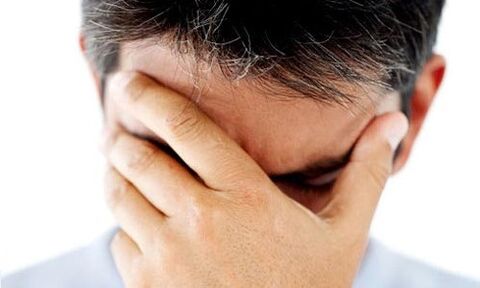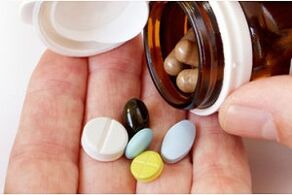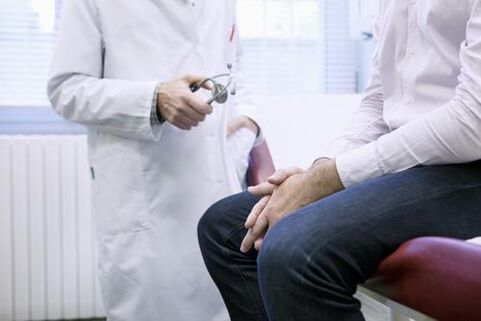The fight against prostatitis is a complex and long process that does not allow self-medication. Since this disease can lead to pathology of male reproductive function and to serious malfunctions in the work of other organs and systems, all measures to make a diagnosis and determine the necessary treatment strategy should be performed exclusively by a urologist. How to treat prostatitis so that the disease recedes as soon as possible and what is the complex of therapeutic measures?

Diagnosis of prostatitis
Identifying the presence of prostatitis in a patient for a urologist is usually not difficult, and the main purpose of diagnostic procedures is to determine the cause and form of the disease. Some types of examinations can cause discomfort or pain to patients, but going through certain stages of clinical diagnosis is necessary for the attending physician to gather useful information:
- Primary digital rectal examination and taking of prostate secretion for analysis, which determines the nature of the disease (bacterial or infectious forms of prostatitis). If an infectious agent is found in the biological material, a test of susceptibility of the pathogenic microflora to antibiotics is performed to optimize the complex of subsequent therapeutic measures.
- Transabdominal or transrectal ultrasound examination. It is prescribed as needed to clarify the characteristics of the condition of the prostate gland. Transabdominal ultrasound is performed through the anterior abdominal wall and does not cause discomfort to the patient. However, a transrectal examination of the prostate (through the rectum) is, though moderately painful, but a more informative procedure, as it allows you to determine not only the parameters of the gland, but also its structural changes.
- Blood test for PSA. Excess in the blood of normal level (4 ng / ml) of prostate specific antigen may indicate the presence of pathological processes in the prostate gland. The determination of PSA indicators should be performed not only in the process of diagnosing prostatitis, but also during the treatment of the disease to evaluate the effectiveness of therapy.
The main therapeutic components and methods of treating prostatitis
Acute prostatitis and exacerbation of the chronic form of this disease are treated according to similar schemes. Properly selected, rational therapy assumes a complete cure of the patient in the first case and leads to his cure or long-term remission of the disease in the second case. Only a urologist can decide how to treat prostatitis without harming the patient's health and with the maximum effect of the means and methods used, the patient's role in this process lies in strict adherence to all specialist prescriptions.
Medical therapy

Drug treatment underlies any therapeutic effect on inflammation in the prostate gland. The selection of the necessary drugs is made by the urologist based on data from laboratory tests and other preliminary studies. The focus of drug therapy includes:
- reduction of the patient's pain level;
- normalization of blood circulation in the prostate gland and adjacent organs;
- localization and destruction of the infectious agent;
- elimination of inflammatory reactions and congestion in the prostate;
- stabilization of immunity, sexual performance, and overall well-being of the patient
Optimal effectiveness of drug therapy is achieved through a combination of antibiotics, sedatives, anti-inflammatory and hormonal drugs, antidepressants, microclists and suppositories in the Wellness program.
Local therapy
The local restorative effect on the prostate gland and its inflamed areas is achieved through the use of different types of physiotherapy in the treatment program:
- ultrasonic phonophoresis;
- transrectal microwave hyperthermia;
- diadinamophoresis;
- laser therapy;
- prostate massage.
It should be noted that, with its relative pain, massage is the most effective means of combating prostatitis. Thanks to such procedures, the stagnant secretion is removed from the prostate gland, which helps to improve the blood circulation of the affected tissues and increase the effectiveness of the medications used by the patient. Massage is prescribed to the patient during periods of remission or reduction of acute manifestations of the disease. During a worsening of the prostate, the procedures are excluded by the doctor from the list of therapeutic measures, as they can provoke the spread of infection.
Phytotherapy
Treatment with phytopreparations is prescribed to patients with prostate as part of complex therapy. The use of herbal health products is possible for a long course, due to their harmless effect on the body and low incidence of side effects. Phytotherapy can be performed through internal and (or) external use, in the form of juices, decoctions or infusions of cantaloupe, ginseng, calamus, thyme, burdock, nettle and other medicinal plants. In the chronic form of prostatitis, the doctor may prescribe magneto-, phono- or electrophoresis of phytopreparations.
Medications in the treatment of prostatitis
The course of drug use by patients is prescribed by their physician on an individual basis. An antibiotic program is designed with the following specific criteria in mind:
- form of the disease;
- type of pathogen and antimicrobial activity of the drug;
- the penetrating ability of the drug into the prostate tissue;
- there are no contraindications to taking the drug;
- the manner of administration of the drug;
- possible side effects
According to the indicators of the effectiveness of treatment of chronic and acute prostatitis, there are three main groups of antibacterial agents:
- Fluoroquinolones. Drugs of this group have a wide spectrum of action and have the ability to accumulate in the tissues of the prostate gland in high concentration; at the same time, resistance of pathogenic bacteria to the active agent has not been developed. The "disadvantage" of fluoroquinolones lies in their potential negative effects on the central nervous system and the likelihood of allergic reactions in patients.
- Tetracyclines. These drugs are most effective against atypical pathogens, but are not sufficiently active in the fight against Escherichia coli and staphylococcus and are completely ineffective against Pseudomonas aeruginosa.
- Macrolides. Macrolide group preparations easily penetrate and actively accumulate in glandular tissues, however, being low toxic and effective in destroying gram-positive bacteria, they are ineffective in suppressing gram-negative bacteria.
In the first few days of taking the prescribed antibacterial medication, a patient diagnosed with prostatitis should visit his or her doctor regularly. Such a measure is necessary for the urologist to trace the effectiveness of antibiotics. If after three days of treatment, the specialist does not notice significant improvements in the patient's condition, he replaces the main drug. When prescribing antibiotics, the physician should consider the patient's experience in taking similar medications in order to rule out prescribing a drug of the same group.
In addition to antibacterial and sedative medications, a patient with prostatitis may be prescribed hormone therapy and / or taking alpha-blockers:
- Hormone therapy. The condition and functions of the prostate depend directly on the amount of androgens and estrogens in the male body. The use of hormonal drugs in the treatment of prostatitis allows you to shift the balance of "female" and "male" hormones in a certain direction. Since such drugs help reduce prostate gland tissue, we can talk about the indirect role of antiandrogens in the healing of a patient with prostate.
- Alpha blockers. Obtaining such funds refers to the method of pathogenetic therapy; its purpose is to relieve the general symptoms of prostate inflammation. The use of alpha-blockers is especially effective for urinary problems. Removal of spasms of the sphincter, ureter walls, smooth muscle of the bladder, as well as the prostate gland itself, prevents stagnation or reverse reflux of prostate secretion and removes edema from the inflamed organ.
Regardless of the purpose and specifics of the use of the drug, the administration of each drug should be carried out exclusively as prescribed by a physician and under his control. Self-medication can lead to a complication of the disease or make subsequent therapy ineffective in the clinic.
Immunocorrection is the key to successful treatment
The whole complex of medical procedures for chronic or acute prostatitis must necessarily be accompanied by immunocorrective measures (regular visits to an immunologist, normalization of lifestyle, taking vitamins, immunomodulators, etc. ). The high immune status of the body contributes to the rapid recovery of the patient or to the prolongation of the remission phase in the chronic form of the disease.

A timely visit to a specialist in case of characteristic symptoms of the disease, strict adherence to medical recommendations in case of diagnosis of prostatitis, prevention of recurrence of an existing disease and a categorical refusal of self-treatment in favor of professional intervention. by a urologist will allow you to avoid long-term treatment and the unwanted consequences of a serious illness.






























